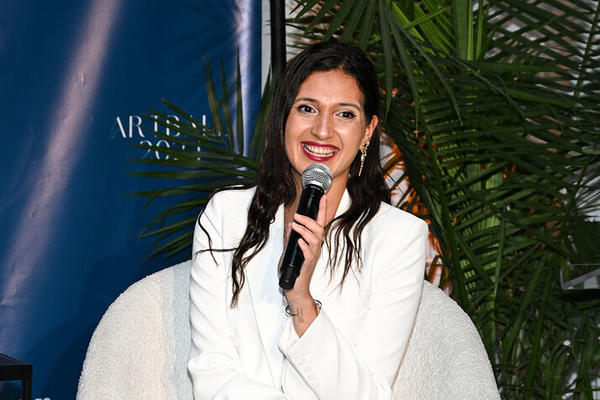#MakingHistory: Omnia El Omrani
Throughout March, we're sitting down with Reubenite women, past and present, to talk about how they're going to be #MakingHistory.
Today, we hear from Dr Omnia El Omrani, who's studying for a Master of Public Policy at Blavatnik School of Government. Beyond this, she's also the trailblazing climate activist who served as the first Youth Envoy for the UN Climate Summit (COP27).
She's going to make history by making sure that human health becomes a central pillar in climate policy.
Human health in the face of climate change
Ever since I began training as a doctor in Egypt, I’ve been passionate about climate change and human health. I’ve dedicated the past eight years of my life to it. How can we implement policies based on the evidence that can then help us respond to the impacts of climate change on health? And how can we reduce carbon emissions using health-based arguments?
So, I pursued the Master of Public Policy (MPP). I’m studying it to help me both as a researcher and as a healthcare professional, particularly to understand how policies and governments work. Through implementation and funding of the right policies, more people can be protected from the health impacts of climate change.
Moments that sparked my passion
Two defining moments that sparked this interest:
- As a medical student, I joined a student organisation that had over one million med students globally and official relations to the UN. They'd send a group to conferences to advocate for medical students worldwide, so I attended my first Conference of Parties (COP) in 2018. There were only about ten of us healthcare professionals advocating for health in the climate negotiations, and I was the only Egyptian.
- During my clinical work, not a day would pass without at least 10-20 children coming in with asthma because of high levels of air pollution in Cairo. We’d give them a chest treatment, operate, then send them back home to live in the same conditions that caused it.
I loved practising, but I just couldn't shake the feeling that there was something more that I could do. Something in the policy space to advocate for the protection of health.
My time as a Youth Envoy
When Egypt hosted COP27, the President of COP decided - for the first time in history - to appoint a young person in the presidency team. I'd never had a position in the government or civil service, but was appointed as Youth Envoy to the COP27 President. I was also initially given a six-month break from my hospital duties to lead the youth engagement effort and present young people's voice, but the President was so happy with my work that he extended my term for another year.
Engaging young people

It's not enough for a thousand young people to show up and protest. To engage the youth meaningfully, we need to integrate them and create spaces for them to participate. During my term, we organised a set of roundtable discussions called the Climate Youth Forum, where young experts could meet and engage with ministers and negotiators sitting across from them.
They could voice their perspectives and solutions, and then the ministers would react and see how they could integrate them. We gathered all the discussion points and considered them in the final decisions made during COP, which were adopted by over 190 countries.
Being at Oxford has been phenomenal
The MPP at Blavatnik is providing me with all of the critical levers to understand policy and influence it.
The economics modules have helped me understand why certain climate policies stall. Making cost-benefit analyses, or learning how to make the economic argument for health intervention, has helped me greatly. This term, we're focusing on politics and law, which has been one of the most powerful climate policy levers recently. I’m learning all the different types of law, how they can be used for climate litigation, and how health evidence can strengthen these cases.
Beyond the coursework, the MPP cohort and direct access to global experts have taught me so much. Recently, I even helped organise field trips to:
- The UK Climate Change Committee, which is a unique public service structure that advises the government on how to fulfil the 2008 Climate Change Act.
- The European Bank for Reconstruction and Development (EBRD), which engages with the private sector on climate change investments.
- The UN’s high-level champions team, which engages stakeholders like business and young people in implementing climate negotiation outcomes.
How I'm #MakingHistory
I'm going to make history by ensuring there's a network that connects grassroots climate-heath initiatives with policymakers and funders. Communities facing climate disasters need healthcare solutions, and those facing the mental health impacts of the climate crisis due to effects on their lives and livelihoods need support.
Different small-scale solutions have tremendous impacts on people’s lives, but they need funding. My vision is to bring the funders, the policy makers, and the decision makers together with the people.
And, at the end of the day, I want to make history by not leaving this Earth worse for the next generations, and not the way that it is right now. They should get to enjoy what I did: the resources, the environment, and the protection of their health.





